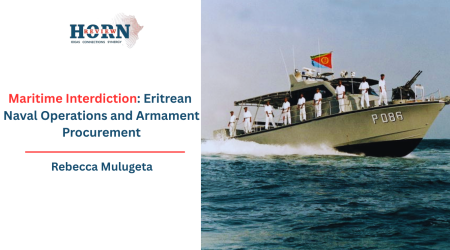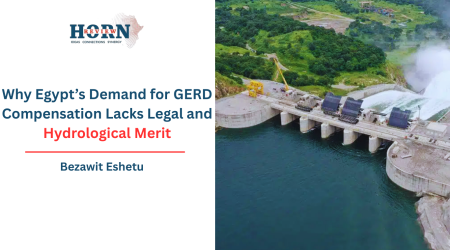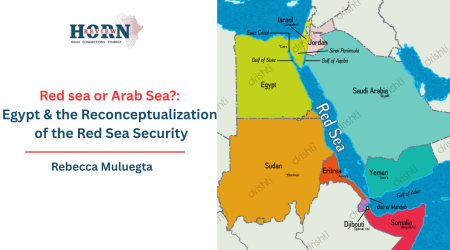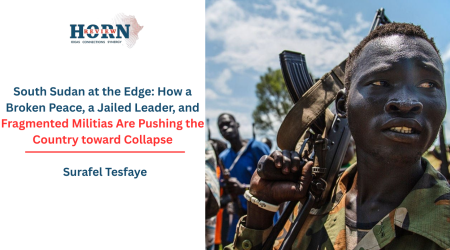
12
Nov
The Risks of Arguing Geography: Cairo’s Red Sea Strategy Could Backfire
By claiming the Red Sea as the exclusive domain of coastal states, Cairo may turn geography into a self-defeating tool, while its exclusion of Ethiopia ultimately undermines its own argument on the Nile.
By Nolawi Engdayehu
In an interview with Saudi Arabia’s Al Arabiya, Egypt’s Foreign Minister Badr Abdelatty drew a hard line over who gets a say in the Red Sea, insisting it is the sole preserve of coastal states and explicitly ruling out any Ethiopian role. Citing geography as an unchangeable decree, he maintained that Ethiopia ‘‘cannot be part of Red Sea issues’’ and cast Egypt and Saudi Arabia as the region’s rightful stewards. The remarks amounted to a sweeping claim of strategic, legal, and moral authority over the Red Sea, sidelining other states and rejecting Ethiopia’s maritime ambitions in full.
The declaration may have achieved its rhetorical aim of signaling strength, but it is strategically risky for Cairo. By portraying geography as immutable, Egypt contradicts historical reality and risks undermining its own position on the Nile. Grounding its maritime and fluvial claims in the language of permanence could invite consequences that would backfire in negotiations with Addis Ababa. By insisting that only coastal states hold the moral and legal right to manage sea lanes, Egypt locks itself into an inflexible stance. If proximity alone determines legitimacy, Ethiopia, which supplies more than 80 percent of the Nile’s flow, could assert an even stronger moral and hydrological claim over the river’s governance.
Throughout history, geography has been anything but permanent. Borders, coastlines, and access to waterways have shifted through wars, diplomacy, and treaties. From Poland to Serbia to the Democratic Republic of Congo, state boundaries have evolved; empires dissolved, states remade, and coastlines redefined. Ethiopia itself once had Red Sea access which it lost with Eritrea’s independence; an arrangement Addis Ababa now partly disputes. The DRC’s narrow Atlantic outlet was a colonial creation. These examples underscore that geography is rarely absolute and littoral status and territorial reach are political constructs.
By using geography as a rhetorical shield, Egypt might gain a short-term advantage in slowing Ethiopia’s maritime ambitions, but the long-term costs could be steep. Ethiopia continues to invest in Red Sea and Indian Ocean access through diplomatic, economic, and security partnerships. If Cairo insists on a closed “littoral club,” Addis Ababa will likely double down on the Nile, rejecting colonial-era treaties it never signed and that excluded it entirely. Those same treaties are now openly questioned not just by Ethiopia but by other riparian states, such as Uganda, which see them as relics of imperial privilege.
This growing sentiment across East Africa, combined with Egypt’s troop deployments near the Ethiopia-Somalia border, suggests an increasingly combustible environment. As the Nile’s waters demand negotiation and shared management, Cairo would be unwise to treat maritime access as a fixed, exclusionary right. The Horn of Africa’s political history shows that monopolies are easy to claim but impossible to sustain, often ending in costly stalemates that benefit no one.
Both rhetoric and policy now reveal that Egypt and Ethiopia view the Nile and the Red Sea as interconnected arenas of influence. Cairo’s approach seeks to deny Ethiopia’s maritime reach while maintaining dominance over Nile flows. Even Ethiopian moves in the Gulf of Aden, far beyond Egypt’s direct coastline, are framed as direct threats. This demonstrates that Cairo’s strategy is not only about keeping Ethiopia off the Red Sea but extends to preventing it from gaining any maritime foothold along the eastern African coast, whether in the Red Sea, the Gulf of Aden, or the Indian Ocean. The goal, it seems, is to keep an assertive Ethiopia commercially constrained, strategically dependent, and economically weak to assert itself on the Nile.
Such rigidity, however, does not serve Cairo’s own interests. Egypt continues to treat colonial-era water treaties as untouchable, even though most riparian states never signed them and receive no guaranteed share under their terms. These hardline positions risk opening a Pandora’s Box of legal and diplomatic disputes that Cairo may not be able to control.
The more sustainable path lies in negotiation rather than exclusion. A forward-looking framework that recognizes Ethiopia’s legitimate maritime ambitions alongside Egypt’s water security concerns could transform two flashpoints into shared assets. Just as maritime governance cannot belong exclusively to coastal states, Nile management cannot remain monopolized by downstream ones. Since the containment strategy has produced neither stability nor influence for Cairo, a cooperative framework deserves a chance to reset the logic of regional governance.
At present, Egypt appears intent on entrenching its maritime posture as a bargaining tool, hoping to force Addis Ababa into negotiations where Cairo retains the upper hand. Yet this assumes a balance of power that no longer exists. The completion of the Grand Ethiopian Renaissance Dam (GERD) already proved that Egypt’s containment strategy can delay, but not derail, Ethiopia’s ambitions. Extending that logic to maritime affairs will only repeat the same failure on a larger scale. Ethiopia will respond with greater determination, making water and shipping regimes across East Africa more unpredictable.
In a region already strained by Sudan’s fragmentation, the war in Yemen, and broader instability in the Horn, escalation between Cairo and Addis Ababa could imperil one of the world’s most vital maritime corridors. The consequences would extend beyond the Red Sea, disrupting global trade routes that link the Indo-Pacific, Europe, and North America.
One of the viable way out on the Nile and the Red Sea issue is a realization sooner than later that the exclusion approach will continue to breed confrontation. Egypt must move beyond viewing Ethiopia as a perpetual landlocked outsider and instead see it as a partner whose access to the sea and participation in maritime governance could enhance regional security. In return, Ethiopia must pursue a cooperative Nile policy that works toward equitable water sharing among all riparian states. A viable future lies in negotiated interdependence.
A balanced bargain could grant Ethiopia a defined maritime role and Egypt a secure, negotiated framework on the Nile. Turning geography from a constraint into an opportunity would allow both states to move beyond the trap of fixed boundaries and fixed hostility.
Nolawi M. Engdayehu is a senior policy analyst focusing on the Horn of Africa. He has worked with international organizations, governments, NGOs, think tanks, and diplomatic missions on regional peace and security, advocacy, governance, disaster risk management, and related cross-cutting policy areas.










